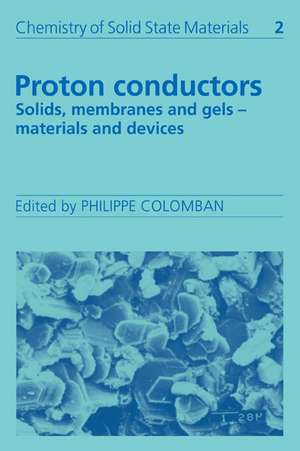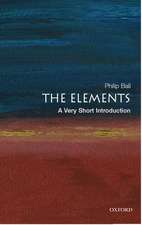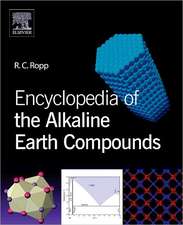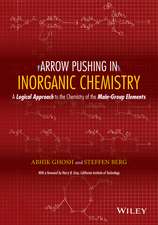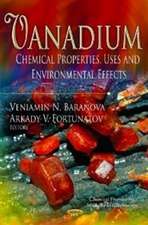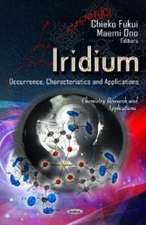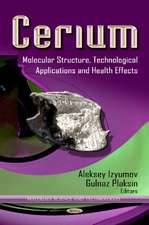Proton Conductors: Solids, Membranes and Gels - Materials and Devices: Chemistry of Solid State Materials, cartea 2
Editat de Philippe Colombanen Limba Engleză Paperback – 10 sep 2008
| Toate formatele și edițiile | Preț | Express |
|---|---|---|
| Paperback (1) | 738.17 lei 6-8 săpt. | |
| Cambridge University Press – 10 sep 2008 | 738.17 lei 6-8 săpt. | |
| Hardback (1) | 1381.11 lei 6-8 săpt. | |
| Cambridge University Press – 24 sep 1992 | 1381.11 lei 6-8 săpt. |
Preț: 738.17 lei
Preț vechi: 858.33 lei
-14% Nou
Puncte Express: 1107
Preț estimativ în valută:
141.26€ • 147.30$ • 117.40£
141.26€ • 147.30$ • 117.40£
Carte tipărită la comandă
Livrare economică 21 martie-04 aprilie
Preluare comenzi: 021 569.72.76
Specificații
ISBN-13: 9780521078900
ISBN-10: 0521078903
Pagini: 616
Ilustrații: 127 b/w illus. 16 tables
Dimensiuni: 152 x 229 x 35 mm
Greutate: 0.89 kg
Ediția:1
Editura: Cambridge University Press
Colecția Cambridge University Press
Seria Chemistry of Solid State Materials
Locul publicării:Cambridge, United Kingdom
ISBN-10: 0521078903
Pagini: 616
Ilustrații: 127 b/w illus. 16 tables
Dimensiuni: 152 x 229 x 35 mm
Greutate: 0.89 kg
Ediția:1
Editura: Cambridge University Press
Colecția Cambridge University Press
Seria Chemistry of Solid State Materials
Locul publicării:Cambridge, United Kingdom
Cuprins
List of contributors; Preface; Part I. The Hydrogen Bond and Protonic Species: 1. The hydrogen bond and chemical parameters favouring proton mobility in solids A. Potier; 2. Protonic species and their structures D. J. Jones and J. Rozière; 3. Proton conductors: classification and conductivity Ph. Colomban and A. Novak; 4. Defects, non-stoichiometry and phase transitions Ph. Colomban and A. Novak; 5. Structural studies of proton conductors J. O. Thomas; 6. Hydrogen in metals: structure, diffusion and tunnelling I. Svare; Part II. Materials: Preparation, Structures and Properties: 7. Structure and characterization of hydrogen insertion compounds of metal oxides P. G. Dickens and A. M. Chippindale; 8. High temperature proton conductors based on perovskite-type oxides H. Iwahara; 9. Highly ionic hydroxides: unexpected proton conductivity in Mg(OH)2 and homologues F. Freund; 10. Ice I. A. Ryzhkin; 11. Anhydrous materials: oxonium perchlorate, acid phosphates, arsenates, sulphates and selenates Ph. Colomban and A. Novak; 12. Hydrogen behaviour in graphite-nitric acid intercalation compounds H. Fuzellier and J. Conard; Section 1. A. Inorganic Ion Exchangers: 13. Proton-containing ß- and ß"-alumina structure type compounds H. Ikawa; 14. Proton conduction in zeolites E. Krogh Andersen, I. G. Krogh Anderson and E. Skou; 15. Proton containing NASICON phases A. Clearfield; Section 2. B. Layer Hydrates: 16. Phosphates and phosphonates of tetravalent metals as protonic conductors G. Alberti and M. Casciola; 17. Hydrogen uranyl phosphate H3OUO2PO4.3H2O (HUP), and related materials Ph. Colomban and A. Novak; 18. From crystalline to amorphous (particle) hydrates: inorganic polymers, glasses, clays, gels and porous media Ph. Colomban and A. Novak; 19. Perfluorinated membranes G. Pourcelly and C. Gavach; 20. Mixed inorganic–organic systems: the acid/polymer blends J. C. Lassègues; Part III. Proton Dynamics and Charge Transport: 21. Incoherent neutron scattering studies of proton conductors: from the anhydrous solid state to aqueous solutions J. C. Lassègues; 22. NMR studies of local motions in fast protonic conductors S. V. Bhat; 23. Vibrational spectroscopy of proton conductors Ph. Colomban and A. Novak; 24. Raman spectroscopic studies of proton conductors R. Frech; 25. Frequency dependent conductivity, microwave dielectric relaxation and proton dynamics Ph. Colomban and J. C. Badot; 26. Measuring the true proton conductivity K.-D. Kreuer; 27. D.c. techniques and a.c./d.c. combination techniques E. Skou, I. G. Krogh Andersen and E. Krogh Andersen; 28. NMR in gels and porous media J. P. Korb and F. Devreux; Part IV. Proton Diffusion Mechanisms: 29. Mobility in hydrogen-containing oxide bronzes: the atomic-level detail R. C. T. Slade; 30. Conductivity mechanisms and models in anhydrous protonic conductors Ph. Colomban and A. Novak; 31. Conduction mechanisms in materials with volatile molecules K.-D. Kreuer; Part V. Devices: Section 1. A. Energy Storage and Production: 32. Applications of perfluorinated proton conductors (Nafions) C. Gavach and G. Pourcelly; 33. Synthesis of polycrystalline H30+ and NH4+ß/ß"Al203 and potential application in steam electrolysis/fuel-cells P. S. Nicholson; 34. Fuel-cells, steam-electrolysis for hydrogen production and hydrogen separation using high temperature protonic conductors H. Iwahara; Section 2. B. Small Components and Microionic Devices: 35. Ice-based devices I. A. Ryzhkin; 36. Solid-state gas sensors operating at room temperature N. Miura and N. Ymazoe; 37. All solid-state protonic batteries J. Guitton, C. Poinsignon and J. Y. Sanchez; 38. Applications of proton conductors in electrochromic devices (ECDs) O. Bohnke; 39. Supercapacitors and interfacial charge accumulation devices Ph. Colomban and M. Pham-Thi; Index.
Descriere
This book gives a comprehensive review of proton conductors, including theory, techniques, the materials themselves and applications.
